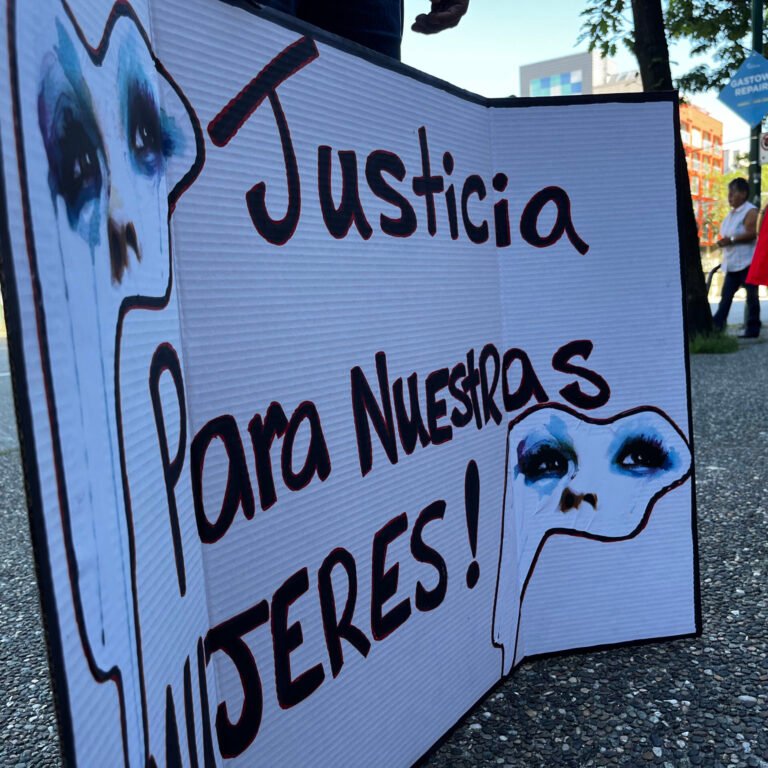Remembering the Victims of Robert Pickton: A Call to Action for Youth
Community Gathering Honours Victims of Serial Killer Robert Pickton at BC Provincial Court.

Community gathering in front of B.C. Provincial Court with front-line workers, healers, and activists to remember the victims of serial killer Robert Pickton. Photographed by Eylul Kara on June 20, 2024
Author: Eylül Kara
Date: June 26, 2024
On June 20, 2024, nearly a month after the death of the convicted serial killer Robert Pickton following a prison attack, the community gathered in front of the BC Provincial Court to honor and remember the victims, many of whom were Indigenous women from Vancouver’s Downtown Eastside.
Remembering and Reflecting
The gathering was a powerful demonstration of solidarity and collective grief. It brought together anti-violence organizations such as Battered Women’s Support Services, community members, family and friends of the victims, healers, and front-line workers, who have long sought justice. While Picton’s death marks the closing of a dark chapter, it also opens a space to reflect on the broader systemic issues that allowed his crimes to continue for so long.
A report published on May 31, 2024, by the National Post stated that Pickton was arrested in 2002 when RCMP officers, conducting a search warrant for illegal firearms on his farm in Port Coquitlam, came across the remains and belongings of missing women. This arguably coincidental discovery led to the years-long investigation of the property.
National Post further stated that Vancouver police faced significant criticism for their handling of the case, as many of the missing women were involved in sex work. In 2014, the investigation’s failures resulted in a $50,000 settlement for the children of the victims, who had sued the RCMP, and all three levels of government.
Addressing Systemic Issues
Pickton’s case not only highlights the immense pain inflicted but also sheds light on the system’s cracks, which often cause marginalized identities to fall through and remain blind to its gaze.
In an interview, Rosa Elena Arteaga, a front-line worker and activist with Battered Women’s Support Services (BWSS), spoke about the broader implications of Pickton’s crimes.
“Violence against women is a pervasive issue that persists despite many believing otherwise,” she noted. “The impacts of colonization, despite being over 500 years ago, continue to manifest through ongoing misogyny, racism, and classism.”
Arteaga further highlighted the systemic racism and sexism that contribute to the systematic victimization of marginalized women. “Indigenous, Black, and racialized women are disproportionately targeted due to inherent biases within the legal system,” she explained. This reflection underscores the need for systemic reform and greater awareness of these deep-rooted issues.

Poster depicting the words “Justicia Para Nuestras Mujeres” (Justice for our women) in the community gathering held on June 20, 2024. Photographed by Eylul Kara
The gathering echoed that it is a time for healing, reflection, and commitment to ensuring that such atrocities never happen again.
So, what can the younger generations do?
Empowering Youth: The Future of Change
A significant part of the discussion with Rosa centered around the role of youth. Rosa shared her thoughts on how younger generations can contribute to this cause by learning, unlearning, and acting.
“For younger generations, they need to reinforce this knowledge that we have been categorized based on our gender, gender identity, race, and class. We live within a structure of power, where there is a dominant group—usually males—at the top of that pyramid of power who get to determine who we are,” she said. “As humans, we should watch out for each other.”
Rosa emphasized the importance of peer-to-peer interactions in combating violence.
“If we think about what younger generations can do, it’s to start with their peers—how they treat other women, other LGBTQ+ communities, and also to expose violence. When they hear a joke, when they see someone harassing a peer, a classmate, or a family member, they should expose it and try to stop it. Organize as groups.”Rosa underlined.
A Collective Call to Action
The gathering today was not only a remembrance but a call to action. “We are a few people coming here to make a statement because there is a guy we believe has killed a number of women, and still, the criminal system is giving him the benefit of the doubt. We are here to expose this,” Rosa echoed.
The voices of the community serve as a reminder of the importance of advocacy, and collective action in the face of systemic failures. Youth and younger generations are crucial to this effort, and their engagement is crucial.
The gathering was an important reminder of the work that still needs to be done. It is important to bear witness and collective responsibility. Within this united effort, the voices and involvement of students, and youth have a powerful place. The commitment and engagement of youth ensure that the journey to equity continues with renewed vigor and hope. Only through collective unity, can we envision a society where the systemic failures of the past are addressed, and the future is built on a foundation of compassion, accountability, and togetherness.
